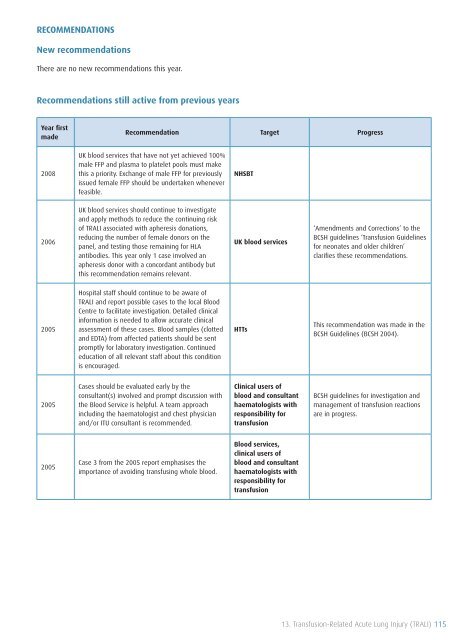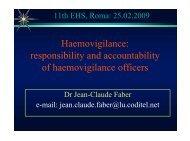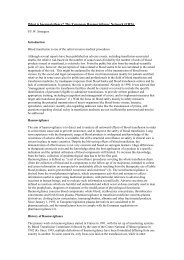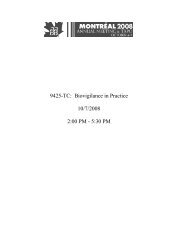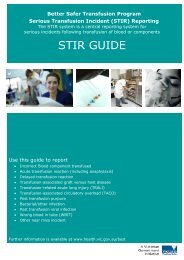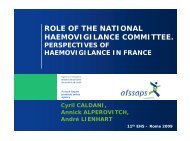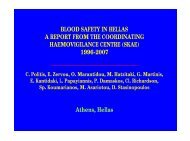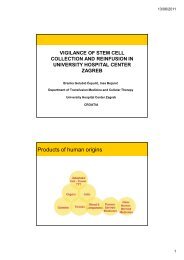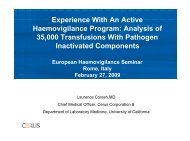SHOT Annual Report 2009 - Serious Hazards of Transfusion
SHOT Annual Report 2009 - Serious Hazards of Transfusion
SHOT Annual Report 2009 - Serious Hazards of Transfusion
You also want an ePaper? Increase the reach of your titles
YUMPU automatically turns print PDFs into web optimized ePapers that Google loves.
RECOMMENDATIONS<br />
New recommendations<br />
There are no new recommendations this year.<br />
Recommendations still active from previous years<br />
Year first<br />
made<br />
Recommendation Target Progress<br />
2008<br />
UK blood services that have not yet achieved 100%<br />
male FFP and plasma to platelet pools must make<br />
this a priority. Exchange <strong>of</strong> male FFP for previously<br />
issued female FFP should be undertaken whenever<br />
feasible.<br />
NHSBT<br />
2006<br />
UK blood services should continue to investigate<br />
and apply methods to reduce the continuing risk<br />
<strong>of</strong> TRALI associated with apheresis donations,<br />
reducing the number <strong>of</strong> female donors on the<br />
panel, and testing those remaining for HLA<br />
antibodies. This year only 1 case involved an<br />
apheresis donor with a concordant antibody but<br />
this recommendation remains relevant.<br />
UK blood services<br />
‘Amendments and Corrections’ to the<br />
BCSH guidelines ‘<strong>Transfusion</strong> Guidelines<br />
for neonates and older children’<br />
clarifies these recommendations.<br />
2005<br />
Hospital staff should continue to be aware <strong>of</strong><br />
TRALI and report possible cases to the local Blood<br />
Centre to facilitate investigation. Detailed clinical<br />
information is needed to allow accurate clinical<br />
assessment <strong>of</strong> these cases. Blood samples (clotted<br />
and EDTA) from affected patients should be sent<br />
promptly for laboratory investigation. Continued<br />
education <strong>of</strong> all relevant staff about this condition<br />
is encouraged.<br />
HTTs<br />
This recommendation was made in the<br />
BCSH Guidelines (BCSH 2004).<br />
2005<br />
Cases should be evaluated early by the<br />
consultant(s) involved and prompt discussion with<br />
the Blood Service is helpful. A team approach<br />
including the haematologist and chest physician<br />
and/or ITU consultant is recommended.<br />
Clinical users <strong>of</strong><br />
blood and consultant<br />
haematologists with<br />
responsibility for<br />
transfusion<br />
BCSH guidelines for investigation and<br />
management <strong>of</strong> transfusion reactions<br />
are in progress.<br />
2005<br />
Case 3 from the 2005 report emphasises the<br />
importance <strong>of</strong> avoiding transfusing whole blood.<br />
Blood services,<br />
clinical users <strong>of</strong><br />
blood and consultant<br />
haematologists with<br />
responsibility for<br />
transfusion<br />
13. <strong>Transfusion</strong>-Related Acute Lung Injury (TRALI) 115


